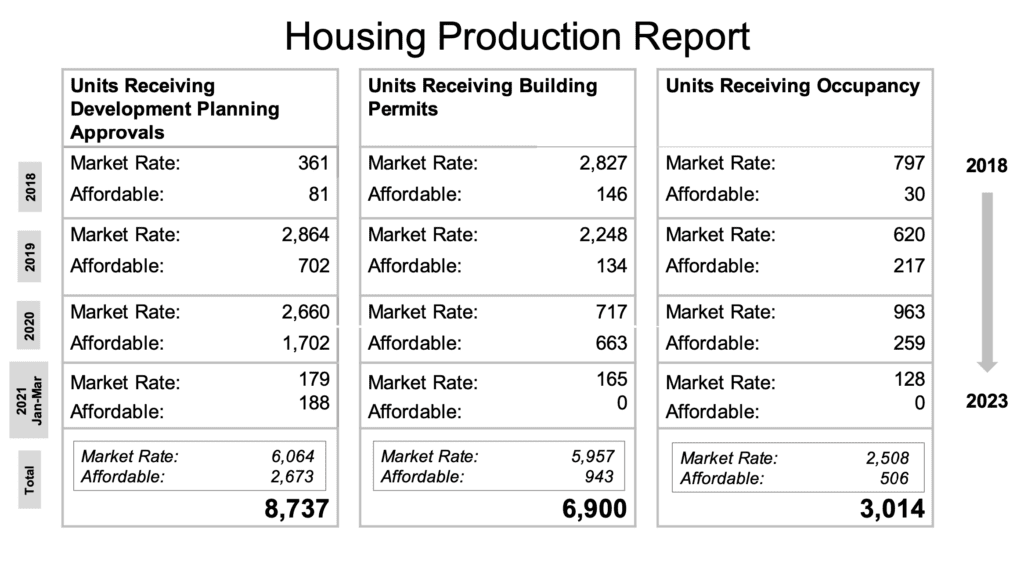There are some “bright spots” in San Jose’s housing crisis plan, but officials say more needs to be done to reach the city’s ambitious goals to prioritize affordable housing.
“The affordable housing pipeline had its best year in 2020 out of the years tracked,” reads a city memo.
Despite that outlook, completed units fall far behind the city’s goal. San Jose has completed 3,348 housing units since 2018, 506 of which are affordable, according to city records. That’s far short of the 25,000 units—10,000 of them affordable—the city has promised by 2023.
On Tuesday, the City Council discussed the housing department’s 43 priorities to tackle the housing crisis, such as building more affordable housing in North San Jose and exploring strategies with Santa Clara County and VTA. Some councilmembers want more details of how the strategies will be implemented, as well as a look at potential barriers in housing construction for approved projects and the city’s housing strategy related to vehicle miles traveled to reduce climate impacts.
“The list raised a little bit of a red flag to me… it was really unclear to me how strategic this plan was,” Councilmember Matt Mahan said, adding he appreciated the work city officials did. “One of the red flags was seeing a list of 43 strategies without the listed impact of each strategy.”
Mahan said he wants to work with city officials to figure out how to “move the needle” to implement strategies, with frequent check-ins.
“It’s about the quality of decisions we’re making and not about overburdening staff,” he said.
According to a report on the city’s Housing Crisis Workplan, there are 6,535 units under construction, including 818 affordable units. The city has approved 7,912 units for future construction, 1,747 of which are affordable. Combined with the number of units built since 2018, a total of 17,795 housing units are either already finished, planned or under construction.
Councilmember Pam Foley said she looks forward to seeing the next update in the fall and asked about building in urban villages, commenting that some were near capacity. City officials promised to come back with a plan to look at building in the villages, as well as the possibility of counting accessory dwelling units toward affordable housing goals—including looking into some of the costs of building the units.
“Ultimately, I appreciate and hope we can get more permits approved and build more housing and affordable housing,” Foley said. “And market-rate housing also helps affordable housing because people move from affordable housing into market-rate housing if and when they can.”
The city first approved the plan in June 2018 at the request of Mayor Sam Liccardo, who introduced a memo on the housing crisis in 2017. The city has updated the Housing Crisis Workplan a few times since then, most recently last November to add information about COVID-19-related activities and the increase in affordable housing production.
Housing in San Jose—both market-rate and affordable—is among the most expensive in the country. According to a report from the National Low Income Housing Coalition, residents pay the second-highest rent in the country. The fair market rent for a two-bedroom home is approximately $3,051 a month.


The report notes that market-rate housing did not fare as well as affordable housing in 2020. A majority of the 717 market-rate building permits approved were for accessory dwelling units, otherwise known as “granny units.” A total of 2,660 market-rate units received planning approvals last year, and the city hopes to complete those units once pandemic restrictions lift.
The city also had difficulty in competing for statewide housing funding last year. Uncertainty about the pandemic, halts in building, declining rents and high vacancy rates contributed to the slowdown in new construction. The high cost of construction and materials such as lumber were also factors.
“The current scoring system is not favorable for projects around the Bay Area,” said Rachel VanderVeen, deputy director of housing. According to VanderVeen, a project near West San Carlos Street has applied for funding five times, which she said was a “significant delay.”
VanderVeen did note that there are some “bright spots,” including a reduction of approval timelines for projects by 20%—an average of approximately nine months—and 7,700 units in the affordable housing pipeline.
San Jose greenlit numerous projects last year: 1,702 affordable units received development planning approvals—63.7% of all affordable units approved since 2018. And 663 of the 943 affordable units with building permits received approval last year.


Affordable housing advocates applaud the city’s progress, but say it’s still far short of the goal of constructing 25,000 homes, and that the thousands of housing units in the pipeline are far from construction.
“I want to remind the council of the urgency of the current situation. More immediate action must be taken to house people who are currently unhoused and to prevent people from losing their housing,” said Felicia Gershberg of the Unhoused Response Group, or URG. “When the URG team goes out in the streets and in the camps, they see more and more people… in desperate need, hungry and living in abysmal conditions.”
Councilmember Raul Peralez called the report “sobering.”
“We’re well off what we need to be,” he said. “Based on the trajectory, we’re not going to hit it. We need to take a deeper dive to see how we can do so.”
Contact Lloyd Alaban at [email protected] or follow @lloydalaban on Twitter.



Leave a Reply
You must be logged in to post a comment.